In the fast-paced world of ecommerce, understanding how your marketing efforts translate into sales is crucial. Many businesses struggle to pinpoint which channels and campaigns are driving conversions, leading to inefficient budget allocation and missed opportunities. This is where ecommerce marketing attribution software comes into play. By effectively tracking customer interactions across multiple touchpoints, these tools provide valuable insights into the customer journey. This allows businesses to optimize their marketing strategies and maximize ROI. In this article, we will explore the importance of attribution in ecommerce and highlight the top tools that can help you achieve better marketing performance.
Ecommerce marketing attribution software is designed to track and analyze customer interactions across various marketing channels. These tools help businesses identify which touchpoints lead to conversions, allowing for informed decisions regarding budget allocation and campaign strategies. For instance, consider a hypothetical scenario where a business allocates a significant portion of its budget to social media advertising without realizing that most conversions come from email marketing. Without attribution insights, they might continue to waste resources on ineffective channels.
Attribution software provides clarity on the customer journey, allowing businesses to understand which marketing efforts yield the best results. By leveraging this insight, companies can refine their strategies and ensure that every marketing dollar is spent wisely. The role of attribution in driving effective marketing decisions cannot be overstated. For more insights, consider exploring digital attribution models to deepen your understanding of how different approaches can affect your marketing performance.
Attribution is crucial for maximizing marketing ROI and gaining deeper customer insights. Many ecommerce businesses face significant challenges when they operate without a clear attribution strategy. Misallocated budgets and ineffective marketing strategies can result from a lack of understanding of which channels are most effective. For example, a brand that fails to recognize the power of retargeting ads may miss out on potential sales from customers who have previously shown interest in their products.
By implementing robust attribution practices, businesses can track customer interactions across various channels, leading to improved marketing strategies and ultimately higher sales. A hypothetical case study of an ecommerce brand illustrates this point: after adopting a multi-touch attribution model, they discovered that their email campaigns significantly contributed to conversions, prompting them to invest more in this area and resulting in a substantial increase in sales. To further enhance your understanding, check out resources on marketing attribution models that can guide you in selecting the right approach for your business.
Understanding the different attribution models available is essential for businesses looking to optimize their marketing strategies. Attribution models can be broadly classified into single-touch and multi-touch models. Single-touch models, such as first-touch or last-touch attribution, assign all credit for a conversion to either the first or last touchpoint a customer interacts with. While these models are easier to implement, they often fail to provide a complete picture of the customer journey.
On the other hand, multi-touch attribution models distribute credit across various touchpoints, reflecting the complexity of customer interactions. This approach helps businesses understand how different marketing efforts contribute to conversions over time. For instance, a customer might first discover a product through a social media ad, engage with it via email, and ultimately make a purchase after visiting the website directly. Understanding this journey can inform more effective marketing strategies. For those interested in more advanced insights, consider investigating multi-touch attribution tools that can enhance your analysis.
As businesses evolve, so too should their attribution models. Choosing the right model based on specific business needs is essential for gaining accurate insights.
Best for: Businesses seeking comprehensive attribution insights that optimize marketing performance.
Cometly is an innovative ecommerce marketing attribution software that helps companies understand their customer journeys.
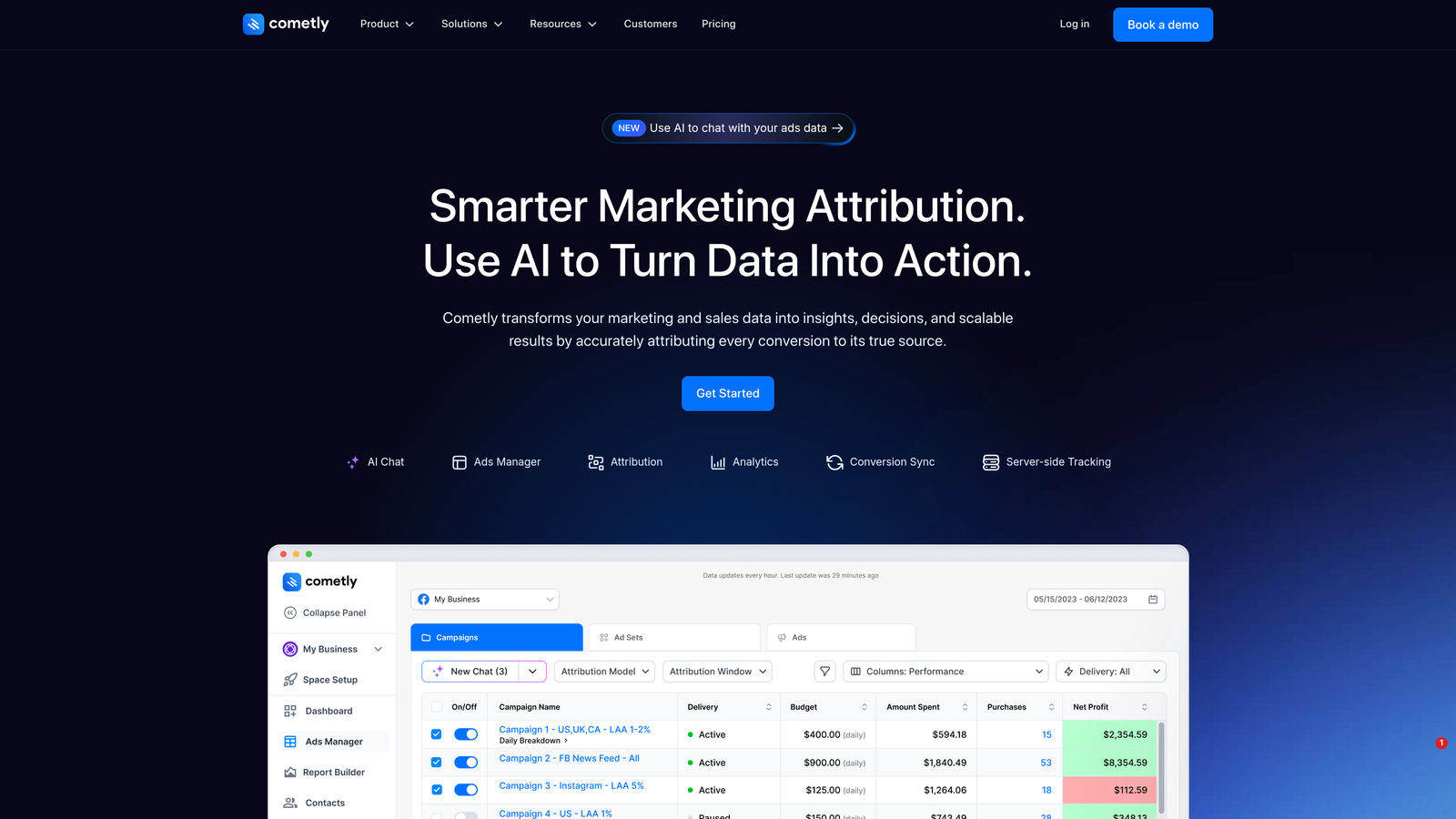
Cometly excels in providing multi-touch attribution insights that drive effective marketing strategies. The platform offers real-time data processing, customizable dashboards, and detailed reporting that empower businesses to make informed decisions.
Where This Tool Shines: Cometly's strength lies in its ability to capture and analyze every customer touchpoint, ensuring that businesses have a complete view of their marketing efforts.
Key Features & Capabilities:
1. Real-Time Data Processing: Instant insights into customer behavior enable quick adjustments to marketing strategies.
2. Customizable Dashboards: Users can tailor their dashboards to focus on the metrics that matter most to them.
3. Detailed Reporting: In-depth reports break down performance across channels, helping businesses identify what works.
4. Multi-Touch Attribution: Understand the entire customer journey and allocate resources effectively.
Pros and Cons:
Pros include a user-friendly interface and extensive analytical capabilities. However, some users may find a learning curve when first using the software.
Best For Specific Users/Personas: Ideal for mid-sized to large ecommerce businesses wanting detailed insights and the ability to optimize their marketing strategies.
Pricing & Value Proposition:
Cometly offers a range of pricing tiers to accommodate different business needs, with a clear value proposition in improving marketing ROI through data-driven insights.
Best for: Businesses looking for a free, powerful tool for basic attribution needs.
Google Analytics provides a comprehensive platform for tracking user interactions and conversions.
Known for its extensive integration capabilities and data visualization tools, Google Analytics is a go-to choice for many marketers.
Where This Tool Shines: It offers robust tracking features that allow users to monitor their website traffic and understand user behavior effectively.
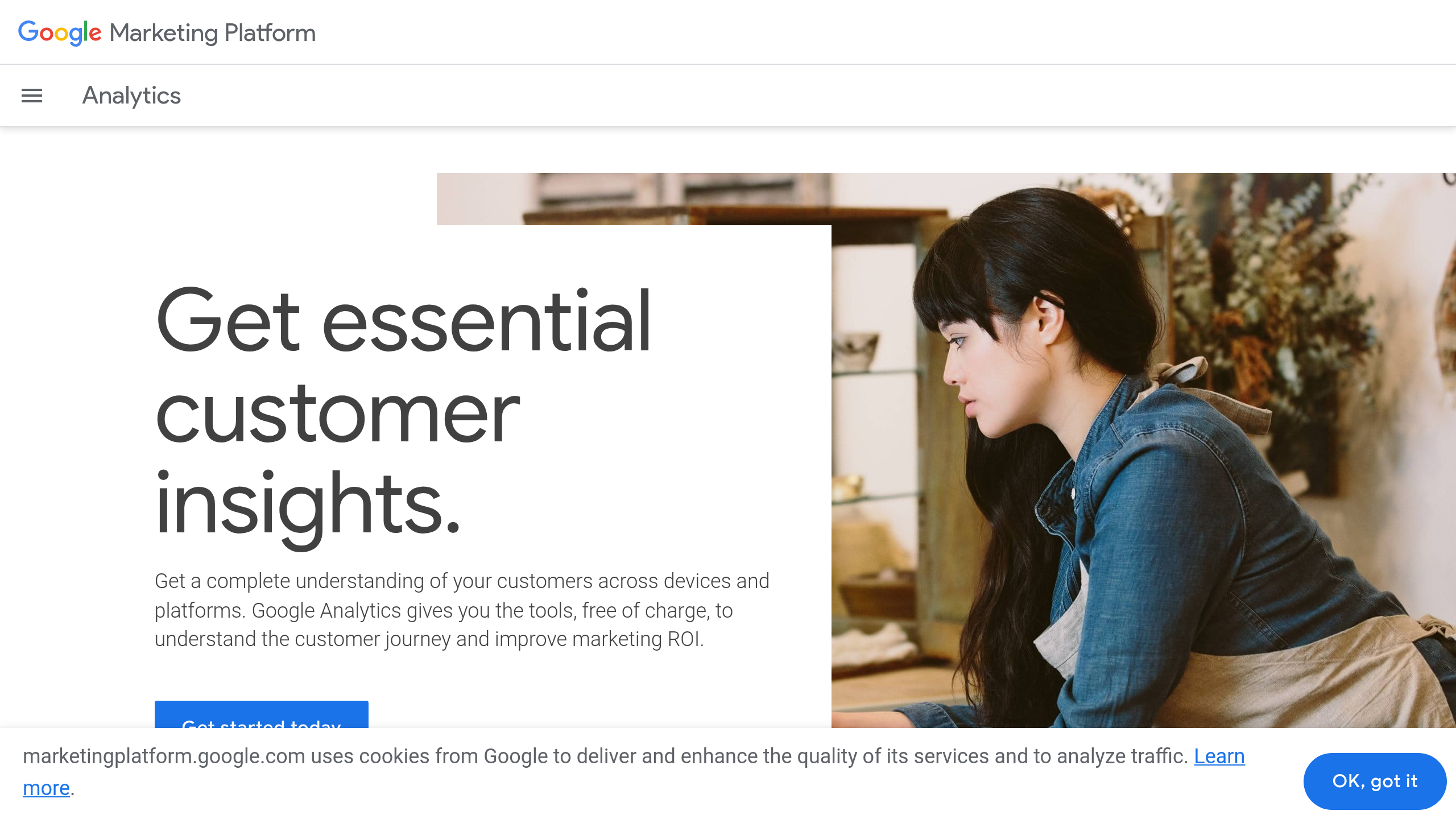
Key Features & Capabilities:
1. Conversion Tracking: Monitor key actions taken by users to evaluate campaign effectiveness.
2. Event Tracking: Set up custom events to track specific user interactions beyond page views.
3. User Segmentation: Analyze data by segmenting users based on behavior, demographics, and more.
Pros and Cons:
The free access and powerful features are significant advantages, but the complexity of the setup can be daunting for beginners.
Best For Specific Users/Personas: Suitable for startups and small businesses aiming to understand user behavior without incurring costs.
Pricing & Value Proposition:
Google Analytics offers a free basic version with options for more advanced analytics through Google Analytics 360.
Best for: Companies wanting an all-in-one marketing platform with robust attribution capabilities.
HubSpot offers inbound marketing tools that include powerful attribution features.
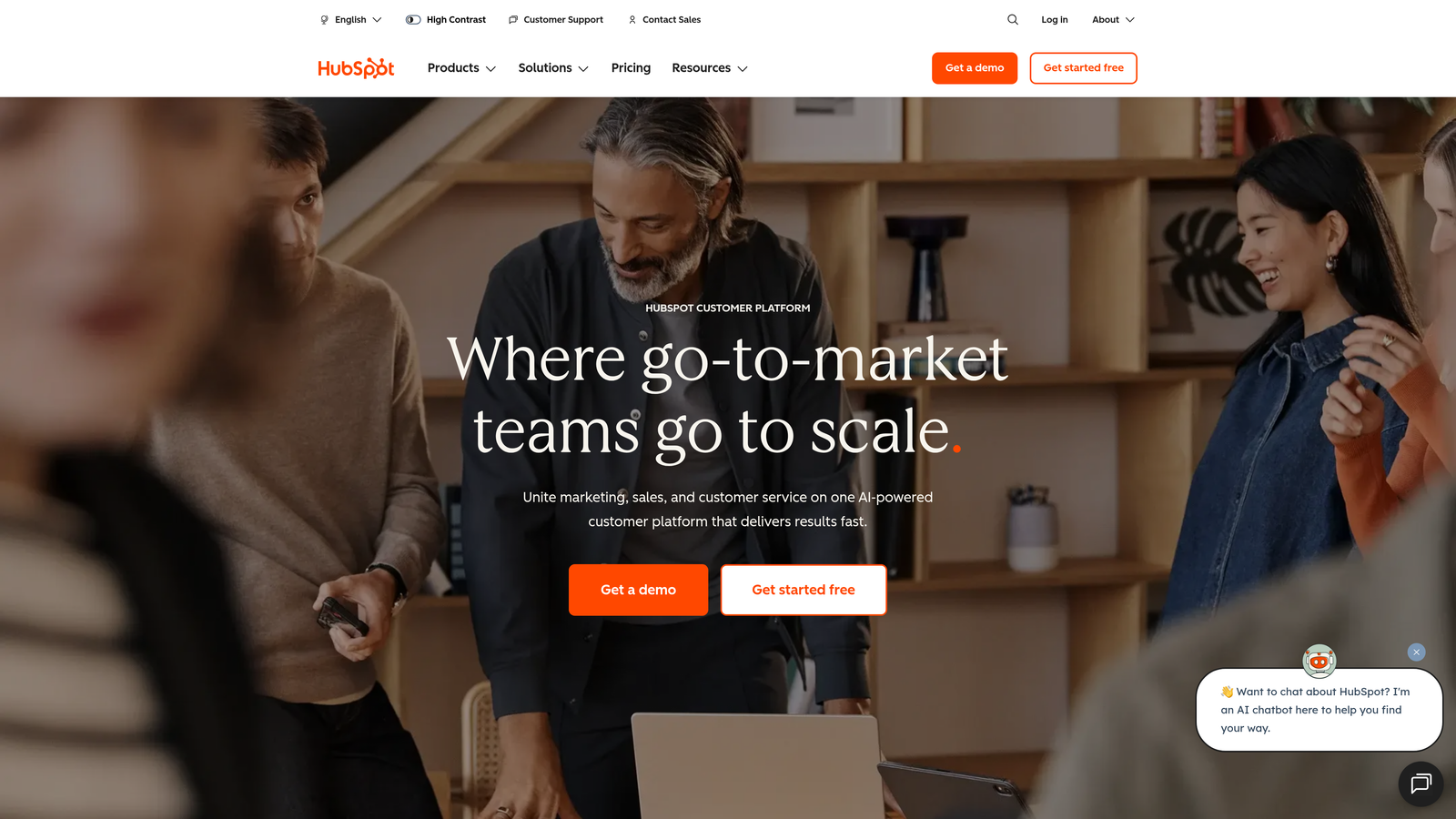
HubSpot stands out with its integrated approach that combines CRM with marketing analytics, making it a comprehensive solution for businesses.
Where This Tool Shines: Its ability to provide a holistic view of marketing efforts and customer interactions makes HubSpot especially valuable.
Key Features & Capabilities:
1. Lifecycle Stage Tracking: Monitor how leads move through the sales funnel.
2. Attribution Reporting: Generate reports that show which marketing efforts contribute to conversions.
3. Integrated CRM: Seamlessly manage customer relationships alongside marketing efforts.
Pros and Cons:
HubSpot's ease of use and integration capabilities are major benefits, but the pricing for advanced features can be a drawback for smaller businesses.
Best For Specific Users/Personas: Ideal for marketing teams looking for comprehensive solutions that combine various marketing functions.
Pricing & Value Proposition:
HubSpot offers tiered pricing with options for different business needs, providing good ROI through its integrated marketing approach.
Best for: Businesses requiring robust data collection and integration.
Segment facilitates the collection and routing of customer data across various platforms.
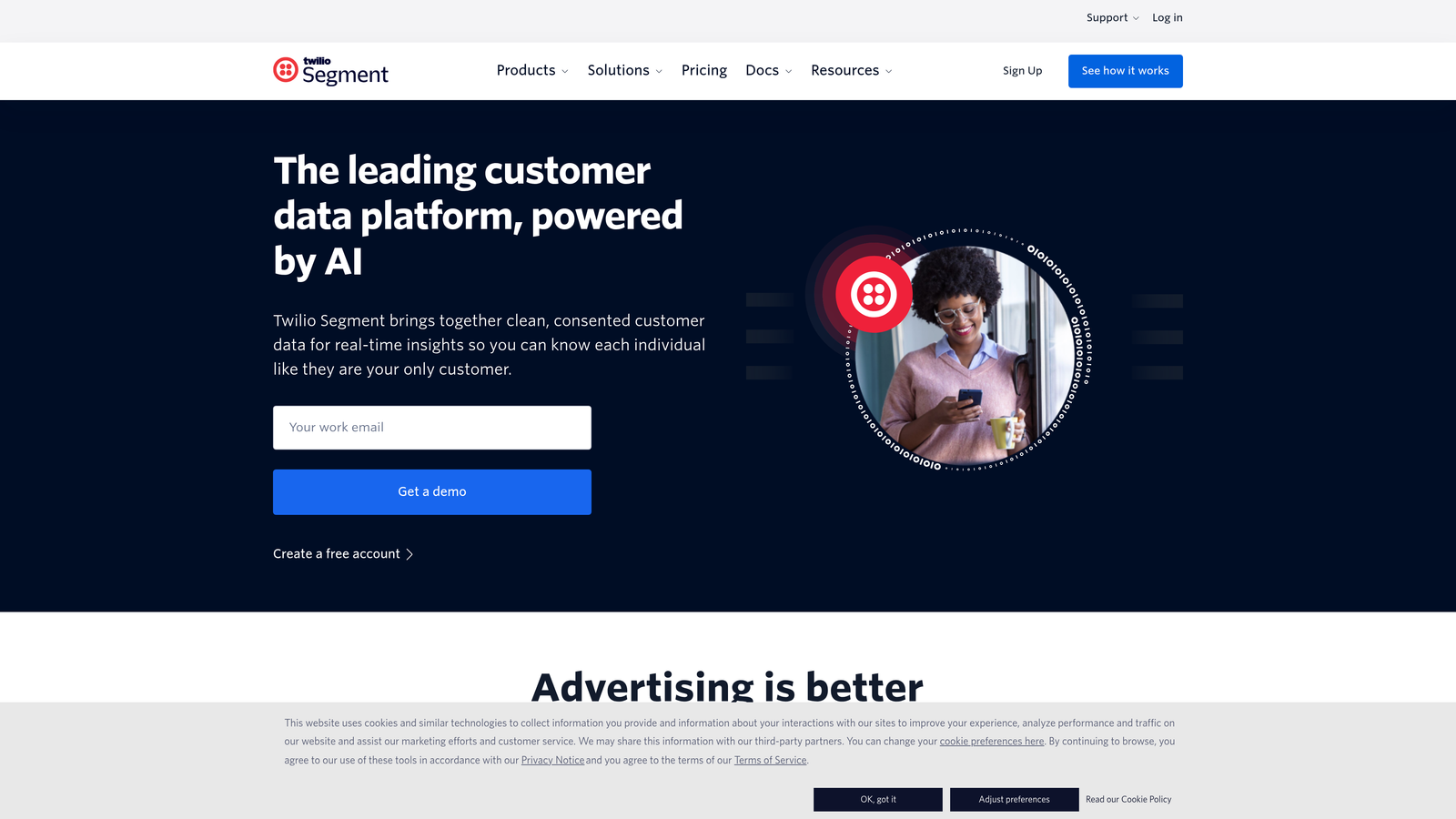
Segment is known for its extensive integration capabilities, making it easy for businesses to centralize their customer data.
Where This Tool Shines: Its ability to simplify data collection and ensure consistency across platforms is a standout feature.
Key Features & Capabilities:
1. Data Governance: Maintain control over data collection and usage to ensure compliance.
2. Real-Time Analytics: Gain insights into customer interactions as they happen.
3. Extensive Integrations: Connect with various marketing tools for seamless data flow.
Pros and Cons:
Segment's flexibility and integration capabilities are significant advantages, though the potential costs can be high for small businesses.
Best For Specific Users/Personas: Best for data-driven companies that utilize multiple marketing tools and need a central data hub.
Pricing & Value Proposition:
Segment offers a variety of pricing models, with a strong emphasis on the value provided through effective data management.
Best for: Businesses looking for advanced attribution modeling.
Attribution provides deep insights into customer journeys and touchpoints.
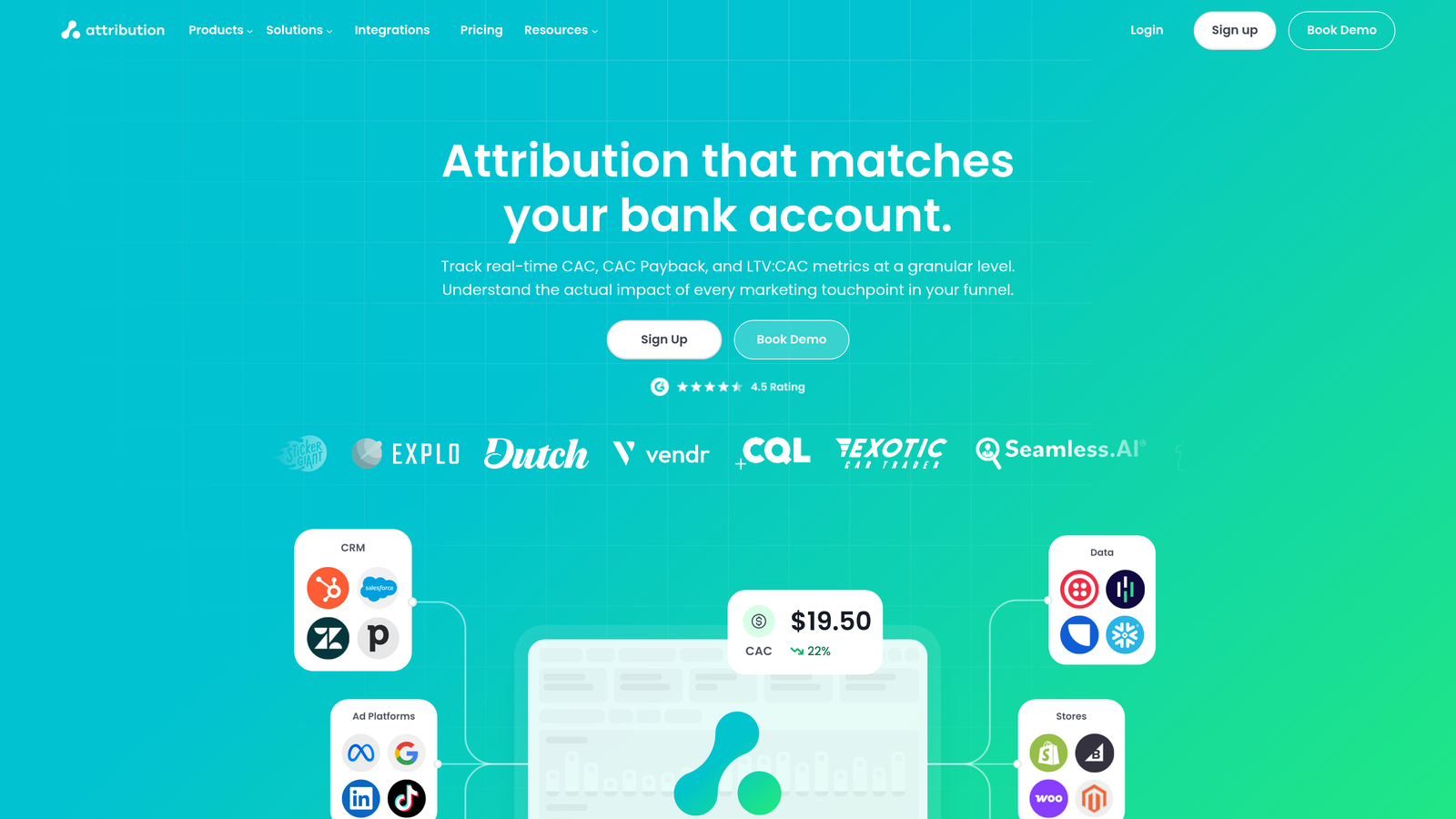
Focusing on advanced multi-touch attribution models, Attribution is designed to clarify the effectiveness of marketing efforts.
Where This Tool Shines: Its focus on providing clarity in multi-touch scenarios is especially valuable for businesses with complex customer journeys.
Key Features & Capabilities:
1. Cross-Channel Attribution: Track customer interactions across various channels and devices.
2. Detailed Analytics: Analyze the effectiveness of marketing campaigns in real-time.
3. Custom Reporting: Generate tailored reports to meet specific business needs.
Pros and Cons:
Attribution offers high accuracy and detailed insights, but its complexity may be overwhelming for some users.
Best For Specific Users/Personas: Suitable for larger enterprises focused on maximizing their marketing spend through detailed insights.
Pricing & Value Proposition:
Pricing is structured around enterprise features, making it a worthwhile investment for businesses aiming to optimize their marketing strategies.
Best for: Companies focused on product analytics and user engagement.
Mixpanel specializes in analyzing user interactions with products to drive business decisions.
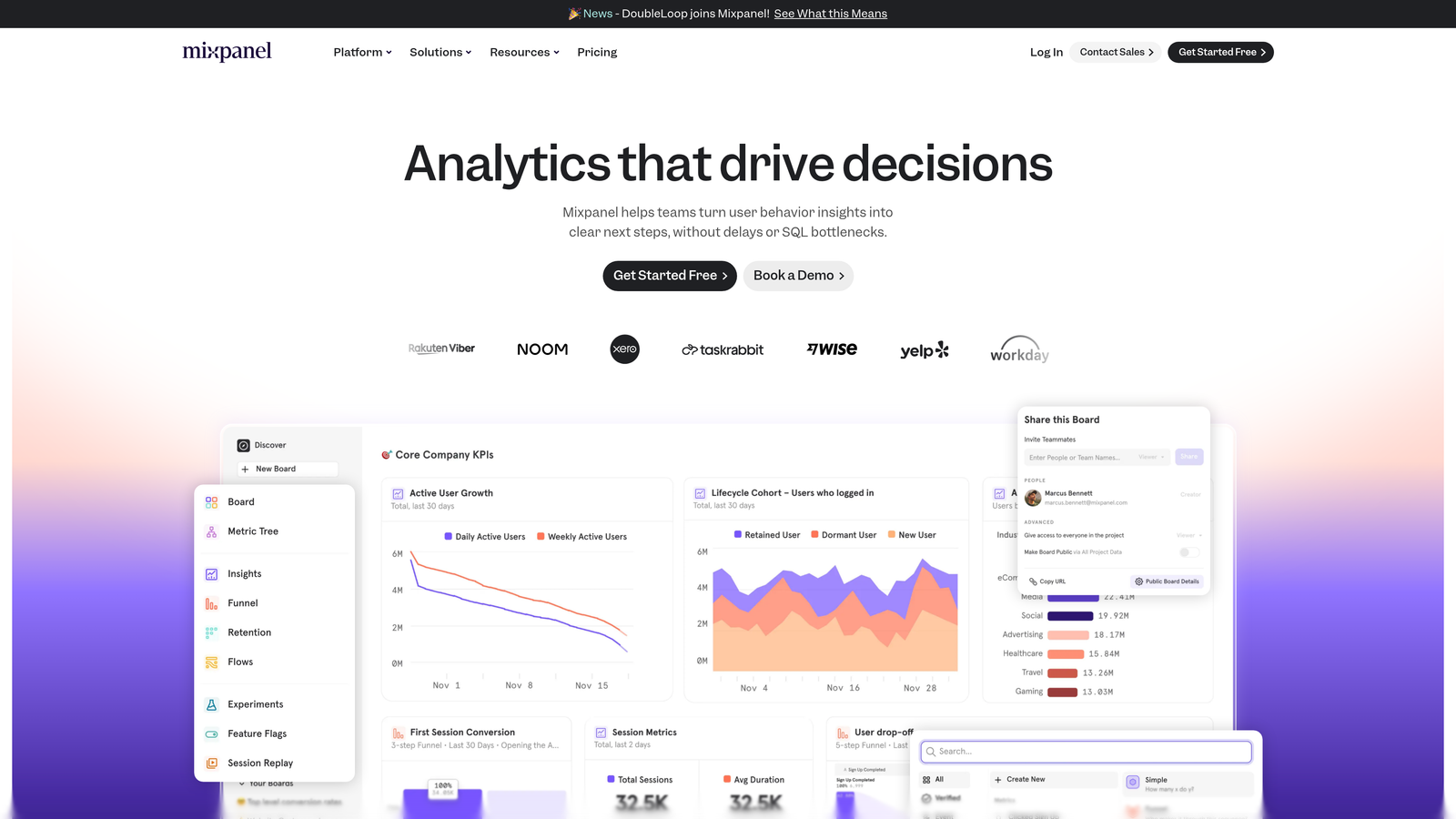
Mixpanel's strength lies in its ability to track user events in real-time, providing actionable insights.
Where This Tool Shines: Its focus on user engagement metrics makes it particularly effective for SaaS and product-based businesses.
Key Features & Capabilities:
1. Funnels: Visualize the customer journey to identify drop-off points.
2. Retention Reports: Understand how well you keep users engaged over time.
3. A/B Testing: Experiment with different approaches to optimize user experience.
Pros and Cons:
Mixpanel provides detailed insights, but the learning curve can be steep for new users.
Best For Specific Users/Personas: Ideal for tech-savvy businesses focused on product development and user engagement.
Pricing & Value Proposition:
Mixpanel offers a free tier with advanced features available at competitive pricing, making it accessible for startups and established businesses alike.
Best for: Large enterprises needing advanced analytics.
Adobe Analytics is part of the Adobe Experience Cloud, offering extensive data analysis capabilities.
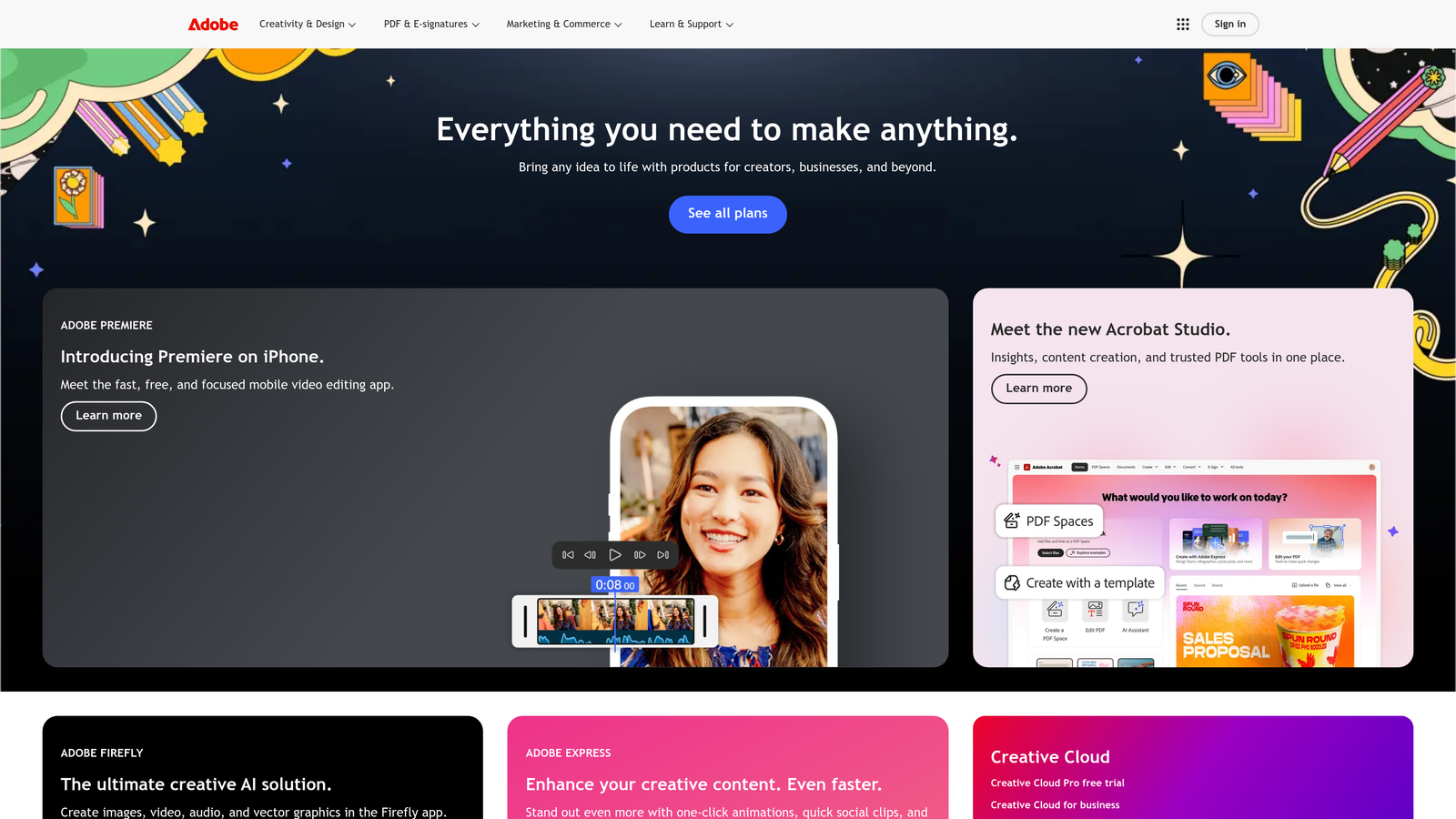
Adobe Analytics stands out for its data visualization and integration with other Adobe tools.
Where This Tool Shines: Its powerful analytics capabilities make it ideal for businesses with complex data needs.
Key Features & Capabilities:
1. Predictive Analytics: Utilize machine learning to forecast future trends.
2. Segmentation: Create detailed customer segments for targeted marketing.
3. Data Visualization: Transform data into actionable insights through visual reports.
Pros and Cons:
Adobe Analytics offers depth and functionality, but it can be costly and complex to implement.
Best For Specific Users/Personas: Best for large enterprises that require comprehensive analytics solutions.
Pricing & Value Proposition:
Pricing is typically enterprise-level, reflecting the advanced capabilities offered by the software.
Best for: Companies focused on customer behavior and conversion optimization.
Kissmetrics tracks users over time to provide insights into customer behavior.
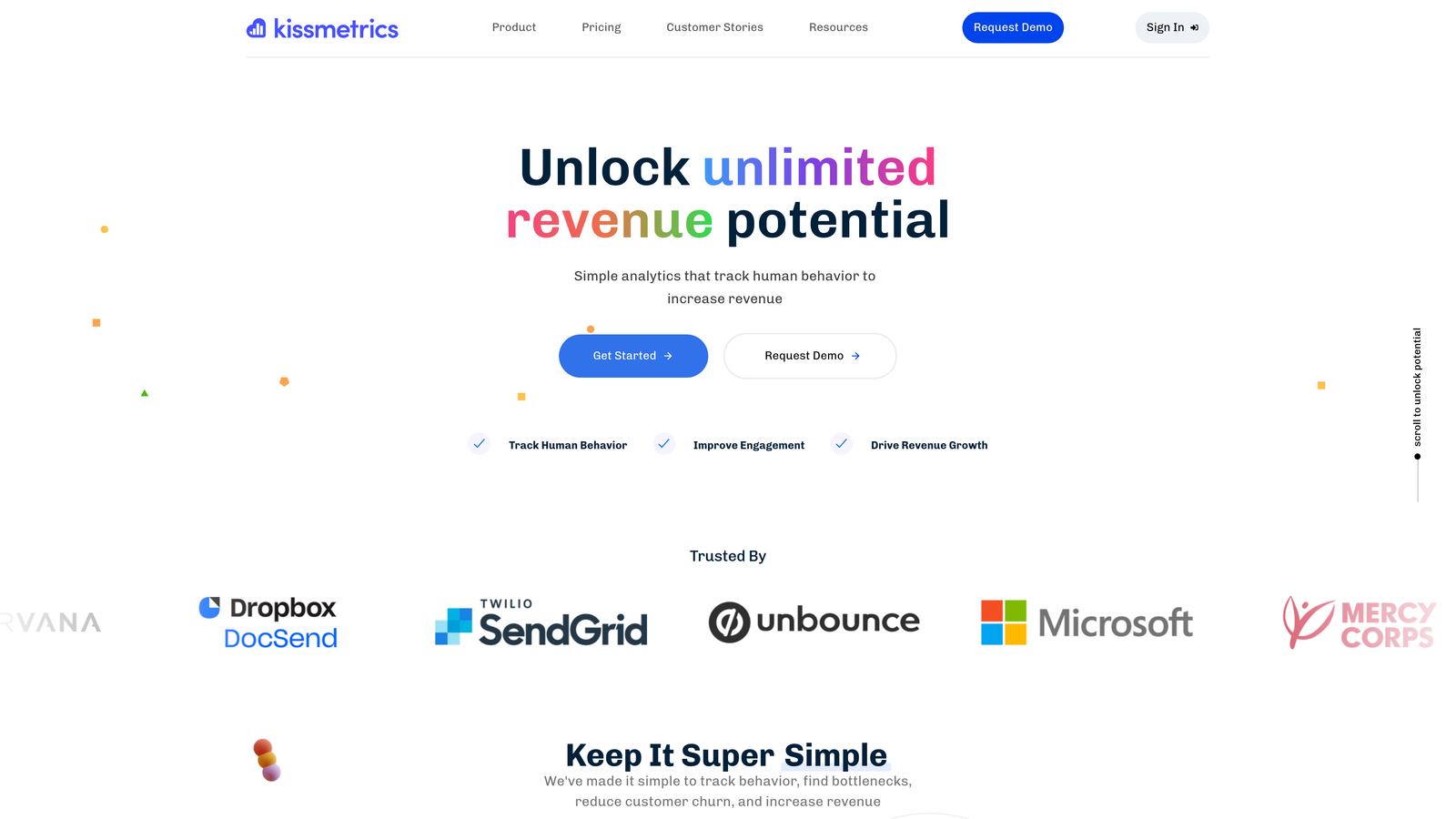
Kissmetrics shines with its focus on customer lifetime value and retention strategies.
Where This Tool Shines: Its ability to track individual user behavior provides unique insights into customer journeys.
Key Features & Capabilities:
1. Cohort Analysis: Understand customer behavior over time.
2. Funnel Reports: Visualize the steps customers take before conversion.
3. Engagement Metrics: Track user interaction with your product or service.
Pros and Cons:
Kissmetrics offers actionable insights, but the volume of data can be overwhelming for some users.
Best For Specific Users/Personas: Ideal for marketers wanting to improve conversion rates through detailed behavioral insights.
Pricing & Value Proposition:
Kissmetrics offers competitive pricing with a focus on maximizing ROI through actionable insights.
Choosing the right ecommerce marketing attribution software can make a significant difference in maximizing your marketing efforts. With so many options available, it’s essential to evaluate tools based on your specific business needs. Consider factors such as ease of use, integration capabilities, pricing, and support when making your decision. By selecting the right tool, you can ensure that your marketing strategies are data-driven and aligned with your business objectives.
Many businesses that successfully utilize attribution software see improved ROI and more effective marketing strategies. If you're ready to transform your marketing efforts, get your free demo today and discover how Cometly can help you optimize your marketing performance.
Choosing the right ecommerce marketing attribution software is crucial for maximizing your marketing efforts and understanding your customer journey. With a plethora of options available, such as Cometly, Google Analytics, and HubSpot, it's essential to evaluate which tools align best with your business goals. Cometly stands out as an excellent choice for its user-friendly interface and robust tracking capabilities, making it easy to link marketing activities to sales conversions. Google Analytics, a staple in the industry, offers comprehensive insights and integration options that are hard to beat. Meanwhile, HubSpot provides a holistic marketing platform that not only tracks attribution but also enhances customer relationship management, making it a favorite among many marketers. When selecting the right software, consider factors such as ease of use, the depth of analytics, and how well the tool integrates with your existing systems. Each option has its strengths, so take the time to assess your unique needs and budget before making a commitment. If you're looking for a solution that combines powerful attribution tracking with intuitive features, look no further than Cometly. Our software is designed to help you make data-driven decisions that propel your business forward. Ready to elevate your ecommerce marketing strategy? Get a free Cometly demo.
Learn how Cometly can help you pinpoint channels driving revenue.
.svg)
Network with the top performance marketers in the industry